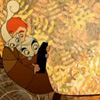
Watching Hellboy 2 – fantastic, by the way, four stars, although the villain gets tiresome at the halfway point and if you’re like me you’ll spend a goodly percentage of the supposed “oh, what a tragedy, alas Babylon!” time thinking “Don’t be so stupid, stupidhead!” Or words to that effect – it struck me that you never really outgrow your storytelling kinks. One of the triangles from Blade 2 make a reappearance in Hellboy 2, right down to Luke Goss playing the same archetype (it’s a good thing they gave him long white hair in this and shaved him bald in that, otherwise you’d think the only difference was that he watched An Inconvenient Truth in the interval between movies).
If you’re me, this is one of the thousand and one things you can worry about as a writer, as I seem to have a fetish for the “hero worrying about what he’ll have to become to resolve the conflict” conflict. I like it, of course, since it’s almost a satire of the usual heroic arc… a hero that starts off light will “mature” into a more serious hero, a hero who starts off dark will lighten into a more at-peace hero (and thus find the “light” preferable). Plus, it makes for an easy contrast. If you take the villain and make him someone the hero doesn’t want to become, then he serves as a cautionary tale. It raises the stakes – if the hero doesn’t do so and so, he’s going to end up like that.
That’s all well and good, you might say, but before you know it, you’re Steven Spielberg and you’ve made a thousand films about your daddy issues. Now, you may not see a problem with being Steven Spielberg, but if George Lucas comes up to you and says he wants the next Indiana Jones movie to have aliens in it, then it’s good to not be Steven Spielberg because Steven Spielberg doesn’t have a good right hook.